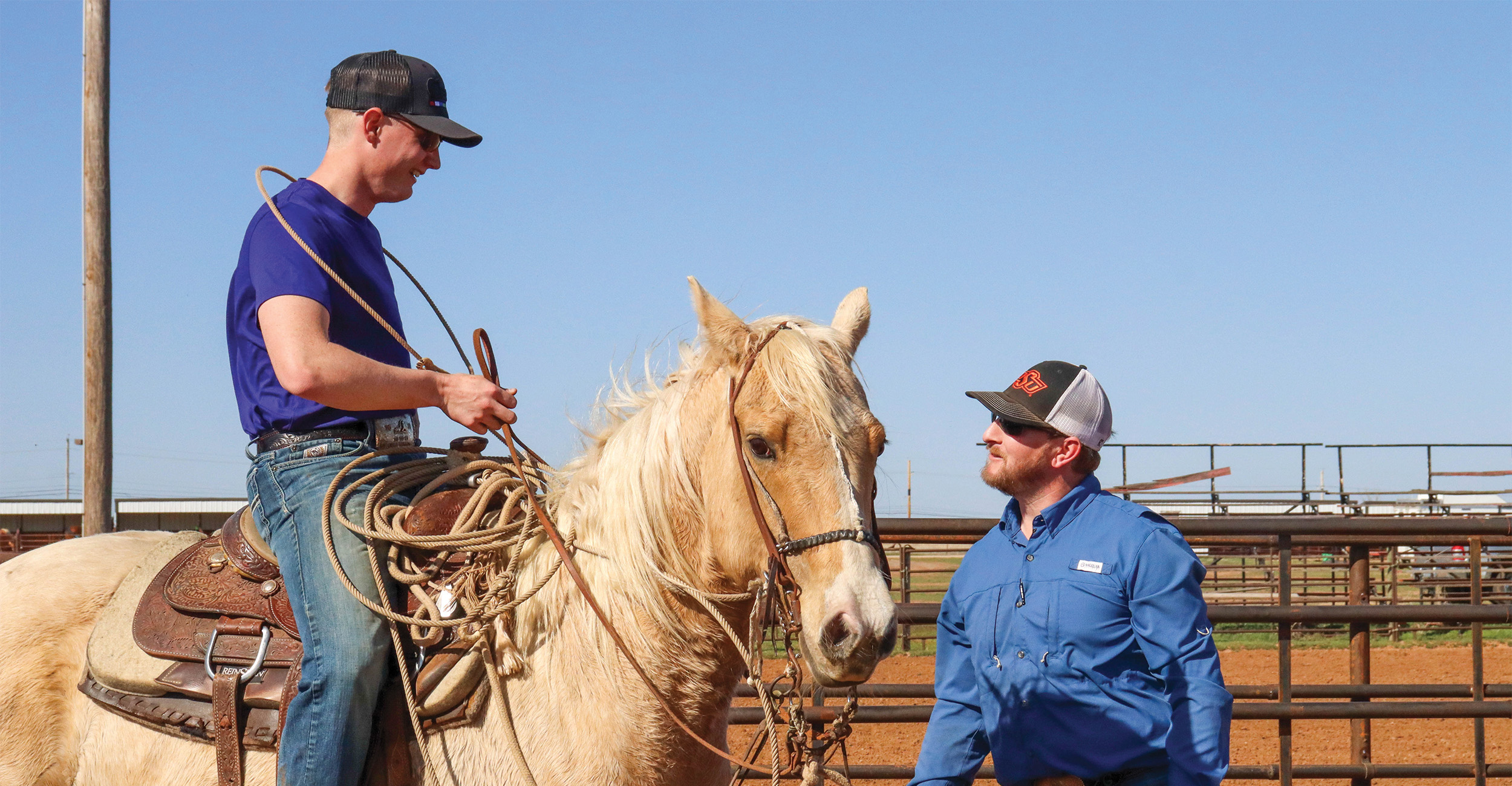
Mastering New Perspectives: Graduate students assist in winning ways
Tuesday, May 28, 2024
Media Contact: Sophia Fahleson | Digital Communications Specialist | 405-744-7063 | sophia.fahleson@okstate.edu
The Oklahoma State University Ferguson College of Agriculture is home to dozens of national titles and championships earned by Cowboys and Cowgirls who take competition seriously.
Behind these achievements, coaches encourage students to do their best, including some coaches who are students themselves.
OSU Agriculture hires graduate students with previous experience in their selected discipline to assist head coaches of various competitive teams.
“We work as a middleman to the students competing,” said Phoebe Rogers, livestock judging assistant coach, “like a confidant or older sibling to guide them.”
Rogers said she always knew she would compete on the OSU Livestock Judging Team, but when she became an assistant coach, her world opened.
“I never thought it would get better than winning nationals, but livestock judging has been so much more rewarding and enjoyable as a coach,” Rogers said.
Once competitors themselves, assistant coaches have been in their students’ shoes. The assistant coaches help students refine their skill set and improve as individuals, Rogers said.
Although students have only one year of eligibility in judging contests, collegiate rodeo allows students to have extra eligibility. Assistant rodeo coaches Cheyenne Bartling and Zane Grigsby once competed alongside teammates they now coach.
“It was a shift for me,” Grigsby said. “Practice was no longer based on how I needed to be ready. Now, I had to focus on everyone.”
OSU rodeo athletes practice together and compete against each other. Points accumulate for individuals and teams in 10 rodeos each school year.
“At first, the transition into coaching was difficult,” Bartling said, “but then I fell in love with it.
“I learned a lot in my master’s program that has helped shape me to fit a leadership role,” she added. “I get to make a positive impact on students every day who are working hard toward their goals.”
Assistant meat judging coach Grace Harris uses her background in livestock judging to help students learn meat judging criteria.
“I had to change my mindset to the broader picture,” Harris said, “explaining concepts in a way everyone will understand by changing my coaching style along the way. It can be frustrating, but it’s helped me grow as a coach.”
Most of the college’s assistant coaches earned their undergraduate degrees at OSU and stayed for graduate school. Their relationships with their head coaches and their previous successes led them to coach undergraduate students.
Allowing graduate students to coach helps head coaches and provides extra resources for students to be successful, Bartling said.
“Coaching has given me a chance to brainstorm different ways to grow our team,” she added. “I have an advantage that I competed with them and now get to coach them.”
However, earning a master’s degree is no small feat between collecting data, completing research and writing a thesis.
Although graduate school is demanding, many students also work as teaching assistants to professors of undergraduate classes they have completed. Graduate teaching assistants grade assignments and help students outside of class.
“Balancing research, classes and a full judging schedule is difficult at times,” Harris said, “but getting to see the students on my team grow and find success is what makes me feel the sacrifices are worth it.”
Rogers said becoming a coach has a steep learning curve.
“As a coach, you go from focusing on yourself to focusing on 20 different people and stimulating them to learn,” Rogers added.
Some of the students conduct research related to their teams’ disciplines. For example, Rogers’ study involves swine growth rate, and Harris researches meat packaging techniques.
“I use what I learned while judging meat every day in the lab,” Harris said.
Megan Newlon is researching factors that affect yearling racehorse sale prices and the COVID-19 pandemic’s impact on those prices while serving as the OSU Equine Judging Team’s assistant coach.
“Although I apply my horse judging background to my research, it’s like I would when I look at horses to buy,” Newlon said. “Judging is a skill anyone involved with horses can use for the rest of their lives.”
Bartling’s undergraduate degree in recreational therapy with a minor in special education led her to use roping as an activity for disabled youth, she said. She has continued her education through her graduate degree in agricultural leadership and the skills she has learned coaching, Bartling added.
“I just like helping people in any way possible,” Bartling said. “I’m passionate about rodeo, but I care about my team in and out of the arena.”
Grigsby attended Oklahoma Panhandle State University to complete his undergraduate degree in biology while competing on the rodeo team and is now an animal science doctoral student.
“I chose OSU for the graduate program,” Grigsby said. “Knowing I could compete on the rodeo team while being involved in their legacy of grazing science just made sense. It’s nice to be a part of something bigger and support the school that supports me.”
When Newlon competed in equine judging in 2021, her team won the American Quarter Horse Association Congress where she also won the reasons portion of the competition.
As a coach, she helped a student win high individual at AQHA Congress for OSU.
“She grew so much,” Newlon said. “She worked day in and day out. That’s the best part of my position, watching these students work so hard and get rewarded for it.”
Story by: Andrea Hanson | Cowboy Journal
